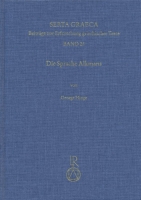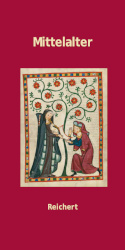Search
Die Sprache Alkmans
Textgeschichte und Sprachgeschichte
2006
17.0 x 24.0 cm, 408 p., cloth
ISBN: 9783895004926
17.0 x 24.0 cm, 408 p., cloth
68,00 €
ISBN: 9783895004926
Short Description
The Spartan poet Alcman is crucial to our understanding of the early history of the Greek dialects and the development of the Greek poetical language. He is not only the earliest choral lyric poet to have his fragments surviving to an appreciable extent, but also the only poet to use the Laconian dialect. Until now, a comprehensive treatment of the idiom of Alcman did not exist. The present book fills this gap, addressing itself to Classicists and Indo-Europeanists alike. The work is at the same time a phonology and morphology of the dialect of Alcman and a historical investigation of the formation of the poetical language and the transmission of the text.Description
The Spartan poet Alcman is crucial to our understanding of the early history of the Greek dialects and the development of the Greek poetical language. He is not only the earliest choral lyric poet to have his fragments surviving to an appreciable extent, but also the only poet to use the Laconian dialect. Until now, a comprehensive treatment of the idiom of Alcman did not exist. The present book fills this gap, addressing itself to Classicists and Indo-Europeanists alike. The work is at the same time a phonology and morphology of the dialect of Alcman and a historical investigation of the formation of the poetical language and the transmission of the text.The choral lyrics of Alcman has come to us in two different ways: as quotations in Classical and Hellenistic authors and, especially, in papyrus fragments of a varying extent and condition. The unfavourable conditions of transmission require a meticulous analysis of each linguistic phenomenon in order to define the form in question more precisely and measure its linguistic and philological consequences more far-reachingly. The value of the work lies above all in the fact that it contributes to a more competent discussion of the dialect of Alcman and the history of the Greek language. Thus, it will once for all eliminate the many ghost forms, lacking any basis in the text, from the philological and linguistic literature.
In addition, the author proposes an original model for the development of the Greek poetical language. He rejects the uncritical projection of the Hellenistic spelling forms onto the Archaic proto-text; instead, he operates with a distinction between a surface structure conditioned by the performance and a depth structure independent of the context. With this heuristic dividing line, the author succeeds in demonstrating that the language of Alcman agrees fundamentally with that of the other Greek poets, particularly Homer. Furthermore, the author argues that the choral lyric poems of Alcman was not in general written down until the Hellenistic age. Even though this thesis, which is not vital to the other results of the work, is without doubt controversial, it will be an important contribution to the ongoing discussion of the orality of early Greek poetry.




 Preface
Preface

 Neuerscheinungen 2023/2024
Neuerscheinungen 2023/2024
 Gesamtverzeichnis 2023/2024
Gesamtverzeichnis 2023/2024
 Katalog Oriental Studies & Linguistics
Katalog Oriental Studies & Linguistics
 Mittelalter
Mittelalter
 Deutsche Inschriften
Deutsche Inschriften
 Musiktherapie
Musiktherapie
 Literaturen im Kontext
Literaturen im Kontext